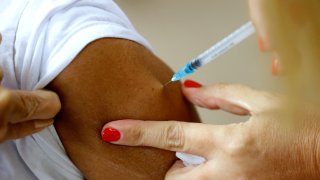
As Covid numbers rise and the more contagious delta variant spreads throughout the United States, people want to know what they can do stay safe.
With talk of some vaccines being less effective against infection with delta — including research released Monday from New York University, which has not yet been peer-reviewed, showing that Johnson & Johnson's one shot is likely less effective against delta — and news of third booster mRNA shot being tested and in some countries selectively administered, many are even wondering if they should try and hack more protection by seeking out a second or third shot or by mixing and matching vaccines.
Some experts are advising additional shots, like Dr. Vin Gupta, a professor at the University of Washington's Institute for Health Metrics and Evaluation, who told CNBC's "The News with Shepard Smith" Tuesday that he is advising patients who got J&J to get a Pfizer or Moderna mRNA dose to combat delta.
However, the Centers for Disease Control and Prevention and the World Health Organization, currently advise against mixing and matching doses due to a lack of evidence.
Dr. Soumya Swaminathan, the WHO's chief scientist, cautioned people who are "voluntarily thinking about [getting] an additional dose," during a press briefing July 12.
Without more data on the safety and efficacy, taking additional doses beyond the two-dose regimen or mixing and matching vaccines is "a little bit of a dangerous trend," she said.
Here's what you need to know.
Money Report
'Mixing and matching' vaccines
Individuals deciding to mix and match their vaccines — like someone who received the Johnson & Johnson vaccine going in search of a shot of an mRNA vaccine as booster, for example — is not currently advised by the CDC, due to a lack of evidence that they're needed.
Get a weekly recap of the latest San Francisco Bay Area housing news. Sign up for NBC Bay Area’s Housing Deconstructed newsletter.
Johnson & Johnson told CNBC that its own data showed the vaccine "generated strong, persistent activity against the delta variant and other highly prevalent variants."
However, Gupta said he hopes that the Food and Drug Administration, the CDC and The Advisory Committee on Immunization Practices (ACIP) allow people who received the one-dose J&J vaccine to get Moderna or Pfizer's mRNA vaccines.
Gupta noted that the NYU study was done in a laboratory setting. Also, there is evidence that combining the AstraZeneca vaccine, which utilizes the same technology as J&J's but is not available in the U.S. yet, with a second dose of Pfizer and Moderna "heightens protection and it's safe," he said.
Researchers from Oxford University recently published findings that combining the AstraZeneca-Oxford vaccine with a dose of the Pfizer-BioNTech vaccine generates a "robust" immune response against the virus. "Based on those studies we should infer that it's safe and effective for J&J-ers," Gupta said. "We're in an emergency and we need to provide national guidance while we're awaiting our own studies internally."
The CDC says that Covid vaccines are "not interchangeable" because the safety and efficacy of "a mixed-product series" hasn't been examined. (The Covid mRNA vaccines are the first of their kind to be approved, so there's no precedent for what effect it could have when mixed with another type of vaccine, according to the global vaccine organization Gavi.)
"We're in a data-free, evidence-free zone here as far as mix-and-match," Swaminathan said during the WHO briefing.
That said, the National Institutes of Health is conducting studies that involve giving people a third dose, either of the same vaccine or booster doses of a different vaccine. Results and safety information from the study should be available in the summer or early fall.
Getting a third dose when you're fully vaccinated
Dr. Anthony Fauci, the WHO, the CDC and the FDA all agree that Americans who are fully vaccinated do not need a booster shot at this time. The vaccines authorized in the U.S. as currently prescribed are all effective against severe illness and death from Covid.
"Virtually all Covid-19 hospitalizations and deaths in United States are now occurring among unvaccinated individuals," White House coronavirus response coordinator Jeff Zients said at a press briefing July 8.
For those who are fully vaccinated, seeking out a third dose or getting more doses than are recommended generally brings up two particularly relevant risks, according to Dr. Jay Butler, deputy director for infectious diseases at the CDC.
First, since there tend to be stronger side effects after the second dose of a two-dose regimen, there's a chance that a third dose could also be associated with higher risk of adverse reactions, Butler said during an Infectious Diseases Society of America briefing July 13. There's just not enough data at this stage to determine if that is the case.
Additionally, with other types of vaccines, there can be "a rare problem whereas you get more and more doses, you actually have a muted immune response," Pavia said in the briefing. This may be an issue with some Covid vaccines, but it is not likely to be the case with the mRNA Covid vaccines, he said.
Ethical and logistical implications
In the United States, 48% of the total population is fully vaccinated against Covid and 67.7% of people have received at least one dose. With those numbers, it's "not appropriate" to assume that everyone needs a booster at this stage, Fauci told CNBC's Andrew Ross Sorkin on "Squawk Box" July 13.
"We still haven't vaccinated enough people in the primary part of this," he said.
Butler agreed that the "top priority" should be to vaccinate people who have received no doses of the Covid vaccine "as soon as possible," before fully vaccinated people get boosters, he said July 13.
And globally, "to [give out boosters] prematurely would use up a lot of vaccine that much of the world needs, as well as divert our efforts in getting people their first dose of vaccine," Dr. Andrew T. Pavia, IDSA fellow and chief of the Division of Pediatric Infectious Diseases at the University of Utah School of Medicine, said in a briefing July 13.
"We are talking about the possibility of a third shot boost and a major component of the world has never even received a single shot," Fauci told CNBC's Becky Quick on "Squawk Box" July 13.
(The White House announced in June that the U.S. would be purchasing 500 million Pfizer-BioNTech vaccines to donate to 92 low- and lower middle-income countries and economies and the African Union that lack access to vaccines.)
Beyond the ethical complications, there are logistical considerations too. "It will be a chaotic situation in countries if citizens start deciding when and who should be taking a second, or a third or a fourth dose," Swaminathan said.
How and when boosters could be rolled out
The ACIP, which develops vaccine recommendations and standards, meets on Thursday, and is set to discuss the clinical considerations for additional doses in immunocompromised individuals.
Fauci did say that the U.S. is not ruling out the idea of a third booster shot, noting that the situation is fluid and contingent upon data that comes out, during an interview with NPR July 13.
The FDA and the CDC's Advisory Committee on Immunization Practices will determine if, when and who should receive boosters, according to data, Butler said.
According to Butler, there are two groups that are most concerning with regards to getting boosters: older people over age 75 to 80, because they are at highest risk of getting severe Covid and received their vaccines earliest; and people who are immunocompromised and therefore "have a more limited immune response to the Covid vaccines that are currently available," he said.
Pfizer said that data from its current booster study will be available in August, and the company plans to apply for emergency use authorization from the FDA for its booster.
This story has been updated to include recent research on the effectiveness of Johnson & Johnson's vaccine against the delta variant and Dr. Vin Gupta's commentary on mixing vaccines.
Sign up now: Get smarter about your money and career with our weekly newsletter
Don't miss: How the Moderna Covid-19 mRNA vaccine was made so quickly






